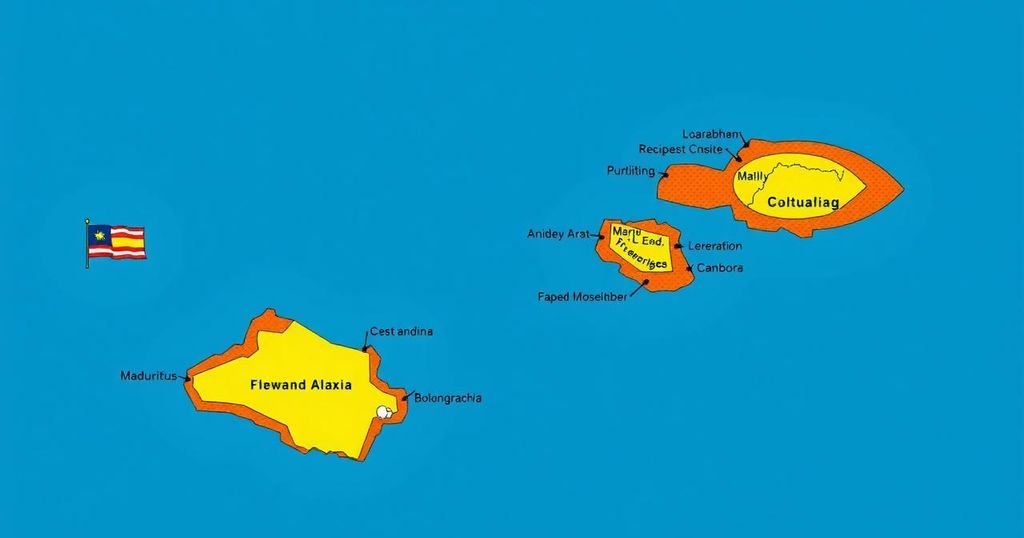Mauritius Parliamentary Elections Focus on Cost of Living Crisis

Mauritius held parliamentary elections amid rising cost of living concerns, with Prime Minister Pravind Kumar Jugnauth and opponents promising economic reforms. Polling opened at 7 a.m., and various coalitions presented strategies for wage increases and tax reductions. Young voters’ influence may be pivotal in this electoral context, as candidates address public dissatisfaction and strive for victory.
PORT LOUIS: On Sunday, Mauritius conducted its parliamentary election amidst a prevailing concern regarding the rising cost of living. Prime Minister Pravind Kumar Jugnauth, alongside his primary opponents, made commitments to address this urgent issue that affects the population of approximately 1.3 million individuals in the Indian Ocean archipelago. The polling stations commenced operations at 7 a.m. (0300 GMT), witnessing a modest turnout of voters verifying their registration before casting their ballots. Voting is anticipated to conclude by 1400 GMT. Mauritius has positioned itself as a significant connector between Africa and Asia, relying heavily on its robust offshore financial industry, tourism, and textile sector for economic sustenance. Although the government projected a 6.5 percent growth rate for the current fiscal year, compared to 7.0 percent the previous year, many citizens claim they have yet to reap the economic benefits. Prime Minister Jugnauth’s political coalition, the Alliance Lepep, has proposed increasing minimum wages, enhancing pensions, and reducing value-added tax on essential goods. The coalition intends to leverage financial settlements from the United Kingdom regarding the Chagos Islands while maintaining control over the US-UK Diego Garcia air base. Additionally, Mauritius benefits from aid provided by China. Political analysts, such as Subash Gobine, commented that “The alliance led by the prime minister is selling the economic prosperity card, with promises of more money to different segments of the population.” The opposition, particularly the Alliance du Changement coalition led by Navin Ramgoolam, also claims to enhance pensions and introduce complimentary transport and internet services while proposing reductions in fuel prices. Youth voters are perceived to hold considerable influence in this election. Voter David Stafford, aged 36, highlighted in Port Louis that young people are seeking economic innovation and employment opportunities in addition to fiscal reforms. Roughly one million residents are expected to fill the 62 parliamentary seats from a selection of 68 parties and five political alliances. In a controversial move, the Jugnauth administration temporarily restricted access to social media platforms until the day following the election, citing national security concerns due to leaked communications among public figures. Following criticism from opposition factions, the ban was lifted shortly afterward. The winning party or coalition will secure not only more than half of the parliamentary seats but also the prime ministerial position.
Mauritius has become a focal point of political and economic discussions as it approaches its parliamentary elections. With a history of stable economic growth, recent projections suggest a slowdown, thus leading to public dissatisfaction over economic disparities. Central to the election discourse are issues of the cost of living, making it an essential topic for candidates and voters. Proposed measures to alleviate economic burdens include wage increases and tax reductions, reflective of the public’s urgent needs. The electoral landscape features multiple parties promising reforms, which collectively signify the electorate’s demand for change and improvement in their economic circumstances.
The parliamentary elections in Mauritius underscore the significance of economic issues, primarily driven by the rising cost of living. As Prime Minister Jugnauth and his rivals contend for leadership, their pledges to enhance wages and reduce taxes reveal a keen awareness of voter grievances. The involvement of younger demographics in the election is a critical factor in shaping the future political landscape. The outcome will not only determine the composition of Parliament but will also reflect the electorate’s response to the current economic challenges they face.
Original Source: www.arabnews.com







